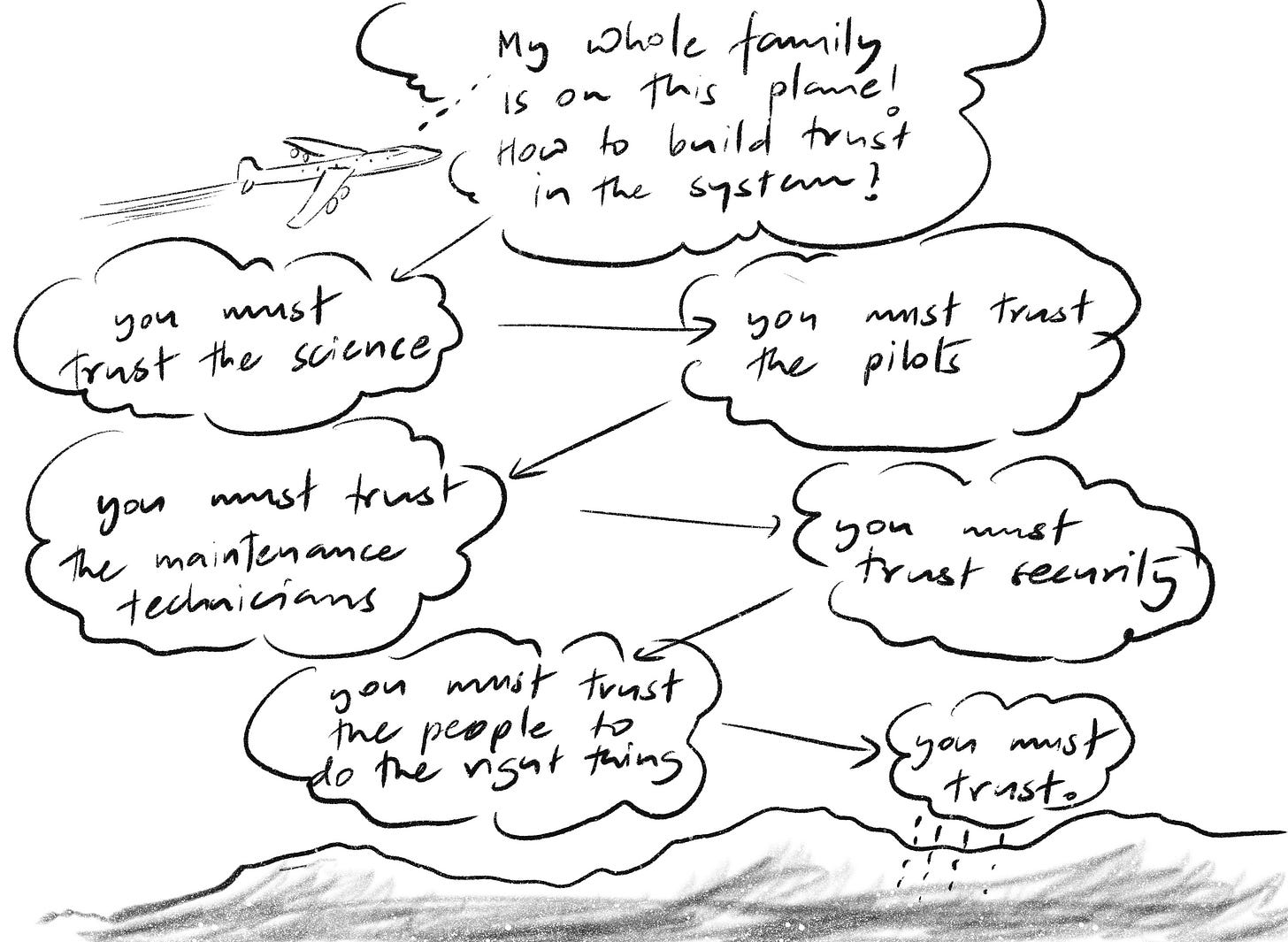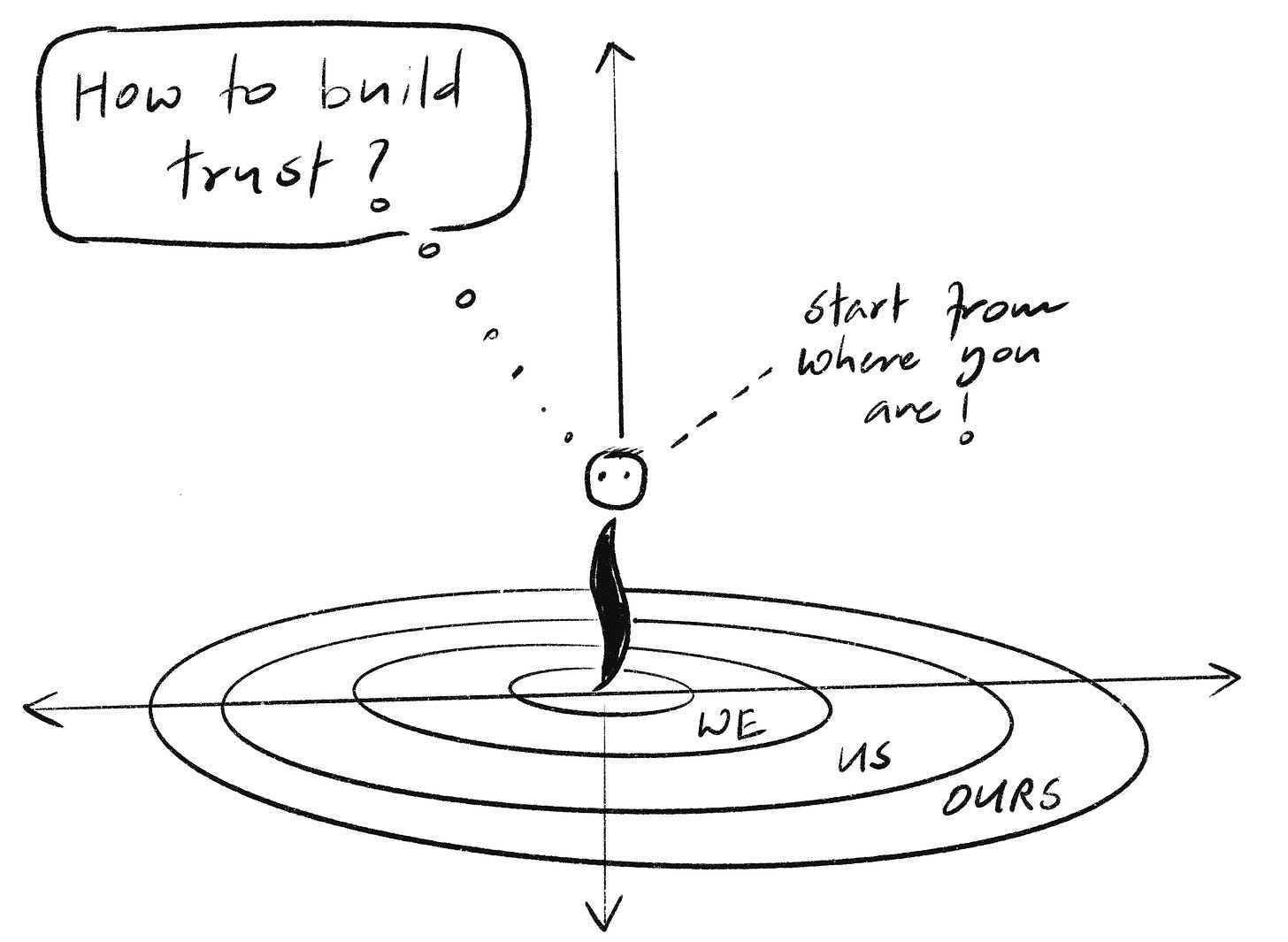Wystem Architecture 3: Connection by Design
On Trust and Connection
Humans are wired to seek trust and connection and it’s hard to create those at scale. Therefore, any discipline that helps us build technologies of trust and connection is an important discipline. Money is a technology of trust. The nation state is another technology of trust. Both have made lives better and both have their misuses.
We believe that philosophy is a source of technologies of trust. It's easy to imagine that a philosophically minded economist could design a better currency than the ones that we have today. So if money is a technology of trust, a better money might come from inputs from ethically informed economists.
We can hope!
The nation state is another technology of trust. I am able to move from one state to another and avail public services because I am a citizen of India. Institutions like parliaments and documents such as constitutions have traditionally been guided by philosophers' ideas. All of us have intuitions about justice, but it takes philosophical work to turn those intuitions into institutions.
Soft Connections
But trust and connection aren't always found in institutional garb. Most of the time we experience trust and connection in interpersonal interactions. I should feel - feel being the important word - that I trust you. Soft forms of connection are as important as the formalized institutional forms.
Does philosophy have anything to say about them?
Is interpersonal connection too grounded in the here and now to benefit from philosophical reflection? We can imagine psychology has something to say, and healers and other mental health professionals have been called upon to build trust and remove social strife. What role does philosophy have to play here?
But of course we know that there's a long tradition of philosophical counsel. The powerful have always received advice in the arts of government from from their court philosophers. From Kautilya to Nagarjuna to Machiavelli, philosophers have taught rulers how to rule. So it's not as if philosophy doesn't have a history of this soft aspect of connection.
But that's for the powerful, what kind of advice can the philosopher give to the person on the street?
Fortunately, wisdom and guidance have never been restricted to the powerful. Throughout history, philosophy has offered insights about living well to people of all backgrounds. Whether through Marcus Aurelius's personal reflections, which resonate far beyond his imperial context, or through teaching stories like the Pancatantra that have educated generations, philosophical wisdom speaks to universal human experiences. Modern philosophers continue this tradition, helping ordinary people navigate ethical dilemmas, find meaning in their lives, and build better relationships with others. The philosophical counsellor serves not just rulers, but anyone seeking deeper understanding.
Still, these wise words rain on us from up above, from the expert in the clouds to the people on the street. Can we reverse the direction of wisdom? Can ordinary people’s philosophical wisdom become an instrument of connection?
We think so, and have acted upon that impulse on many an occasion, especially with our citizen juries.
This is where we have learned a lot from our citizen juries. The jury model shows how ordinary people can become practical philosophers by engaging deeply with issues affecting their communities. Through structured deliberation, jurors develop the capacity to step back from immediate self-interest and consider the broader wellbeing of society. They learn to weigh evidence, consider multiple perspectives, and work toward solutions that balance competing needs.
This philosophical mindset - combining ethical reasoning with practical wisdom - emerges naturally when people are given the space and support to tackle complex challenges together. The jury process helps citizens develop skills in systems thinking, ethical deliberation, and collaborative problem-solving - core philosophical capabilities that can be applied to address everything from local infrastructure needs to climate adaptation. By participating in citizen juries, community members gain confidence in their ability to analyze issues carefully, imagine better futures, and work collectively toward practical solutions. They become philosophers not through abstract theorizing, but through the lived experience of working with others to understand and improve their shared world.
Conclusion
The journey from abstract philosophical reflection to practical wisdom embodied in citizen juries represents a key evolution in how we think about trust and connection in contemporary society. While traditional technologies of trust like money and nation-states have played vital roles in enabling cooperation at scale, they often fail to create the deeper forms of connection needed to address today's complex challenges. The citizen jury model demonstrates how philosophical wisdom can be democratized and made practical - not through top-down expertise but through structured spaces for collective deliberation and action.
This approach aligns with the broader Wystems framework we've explored throughout this series. Like the Ecological Programming Interface (EPI) discussed in previous essays, citizen juries create standardized methods for diverse stakeholders to interact meaningfully while preserving local autonomy. They embody what we've termed "wisdom-centric design" by actively promoting trust, empathy and justice through their very structure. And they demonstrate how the philosophical archetypes introduced earlier - the Elephant who sees wholes, the Architect who builds frameworks, and the Connector who bridges domains - can work together in practice.
Most importantly, these experiments in citizen deliberation show how philosophical counsel can flow in multiple directions - not just from experts to citizens, but between citizens themselves as they develop collective wisdom through structured engagement with shared challenges. This "reversible wisdom" suggests new possibilities for democratic practice that go beyond both traditional hierarchies and simplistic populism. As we continue to develop and refine these approaches, we move closer to technologies of connection that don't just enable interaction but actively cultivate the wisdom needed to navigate our complex world.








